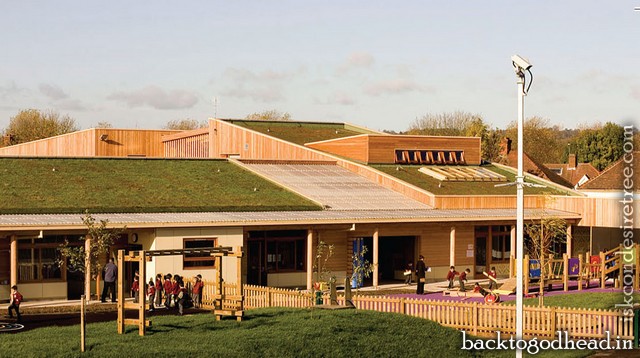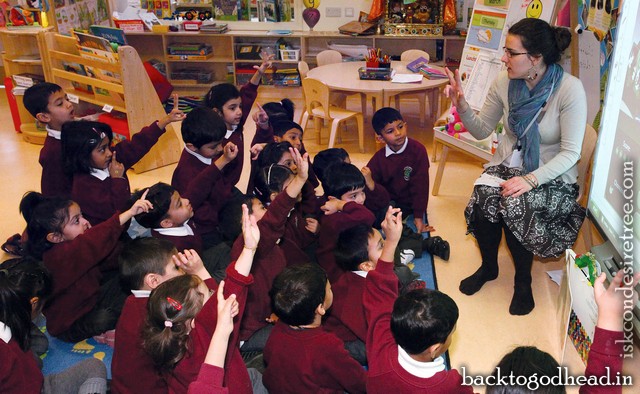Welcome to England’s first state-funded Krishna centered school, a state-of-theart learning environment that nurtures Vaishnava values.
In many parts of the world, parents must choose between free secular education and expensive religious-based schools. But now in Britain, as in Australia and New Zealand, the government meets the operating costs of schools run by all religious institutions (as a result of funding increases over the last fifty years, and a widening of the policy, since 1997, to include faiths other than Christians and Jews). This program allows children to learn regular school subjects in a cultural environment where the etiquette and some of the infrastructure are faith-based, without parents having to pay school fees on top of taxes. About seven thousand-almost a third-of England's schools are church or faith schools, yet until recently the followers of the sacred Vedic texts lacked a state-funded school. The run-up to one started in 2005. That year, the iFoundation, established by a few congregation members of Bhaktivedanta Manor in 2003 to create enterprises that embody and promote Vaisnava values, won approval for a primary school that would have ISKCON, the Hare Krishna movement, as its faith partner. The iFoundation's first four directors were Nitesh Gor (Navina Krishna Dasa), Prashun Popat, Pradyumna Dasa, and Upendra Kalan.
The resulting school, built in Edgware, a town in the northwest London borough of Harrow, is named Krishna-Avanti. The state contributed the majority of the construction costs; the rest came from voluntary aid. Completing the school reached a dramatic high point when a last-minute loss of private funding jeopardized the project, which required four million dollars (£2.5m) in voluntary aid. The iFoundation sought the assistance and guidance of the experienced Patron Council of Bhaktivedanta Manor, and together, within two days, they developed a strategy to safeguard the project. That in-cluded taking the risk of underwriting the financial shortfall while support was sought from congregation devotees and others. This typified the risks, sacrifices, and challenges that the many devotees involved in the project undertook. The experience certainly made the iFoundation directors more appreciative of the great surrender, sacrifice, enterprise, and achievements of srna Prabhupada and his disciples.
In 2011, a second Krishna-Avanti primary school opened in Leicester. Soon a primary school will open in Redbridge and an "all-through" (primary and secondary) school in Harrow. That ISKCON is the faith partner for Britain's first Hindu schools means that the British government and the Hindu community recognize the spiritual path of loving devotional service to Krishna, which the ISKCON devotees teach, as an essential and authentic branch of Vaishnavism, the largest of several primary traditions that make up Hinduism.
What does the school's faith-based character mean for children? Naturally, the soul's eternal occupation of service, called sanatana-dharma in Sanskrit, is a fundamental feature of the school day. At the center of the new school building stands a temple built according to a Vedic architectural system, scaled down to three-quarters size for the children. The school day starts with kirtana as the children observe Krishna and His brother, Balarama, on the altar. Krishna and Balarama attended school together long ago in Avanti (present-day Ujjain, India). The name Krishna-Avanti, which can be translated as "Krishna in Avanti," is meant to inspire fondness for God and education.
The temple is made of Makrana marble, the same material used on the Taj Mahal. Two hundred Indians in the town of Makrana, Rajasthan, carved the marble before it was shipped to Edgware.
The temple's central location in the school led to huge challenges during the construction. Delays in India and the lack of suitable stone masons in the UK posed a logistical nightmare. The iFoundation wanted to hire stone masons from India, but for them to get work visas, they needed to pass a competency test in English. So the iFoundation paid for up to ten of them to study full time, in the expectation that enough would pass. But all failed. Providentially, the iFoundation located UK based stone masons to overcome this problem.
The Spiritual Element At Krishria-Avanti
Spirituality is present not only in the collective worship at KrishnaAvanti; it is woven into the National Curriculum the school teaches, and it influences far more than just the study of religion. Rasamandala Dasa, author of The Heart of Hinduism, a work used for religious education in Britain's schools, helped enhance the Krishna-Avanti syllabus by looking at what Vaisnavism could add, such as its developed concepts of the inclusivity and equality of all beings and its emphasis on interactive and experiential approaches to education. Teaching children spirituality brings a sense of transcendent purpose to schooling and character formation. Although today's schools have programs to teach values, unfortunately for the students the schools emphasize careers and mundane opportunities. The Krishna-Avanti teachers know that when children receive an education steeped in spiritual values, they can become what srna Prabhupada describes as the best citizens: clean, honest, law-abiding, loyal, healthy, and industrious.
Evaluating the first KrishnaAvanti school, the Office for Standards in Education, Children's Services and Skills said, "The pupils' joy in coming to school is very evident and is demonstrated in their regular attendance, punctuality, first-class behavior, and sense of purpose. They play and work in total harmony and respond enthusiastically to their teachers. The pupils' spiritual, moral, social, and cultural development is outstanding."
Yoga practice, Sanskrit classes, music, dance, and drama lessons using Indian and Western styles and instruments, and pure vegetarian meals offered to Krishna and Bala-rama and eaten in the traditional Vedic way-sitting cross-legged on the dining-room floor-also set Krishna-Avanti apart from other schools.
How are controversies between science and faith dealt with at Krishna-Avanti? The book In Good Faith provides a look at "schools, religion, and public funding" in the UK. The authors note that in science education the concept of God is sometimes challenged and found unscientific and irrelevant. In this scheme of things, all creatures lack a spirit soul and are the products of evolution. This view conflicts with the Vaisnava view that God and the soul are at the heart of the beginning of the universe. So, like the schools mentioned in In Good Faith, Krishna-Avanti provides science teaching from its own perspective, staying true to the school's religious convictions and encour-aging critical thought on scientific issues.
As for academic subjects, the students achieve excellent scores. In the National Curriculum tests (SATs) on Science, English, and Math, every Krishna-Avanti student in the age five-to-seven group exceeded the expected level, or national average.
Sanatana-dharma, as the soul's nature, is a consciousness that spiritualizes many of the school's activities. The students learn verses from the Bhagavad-gita, one of God's most blessed gifts to humankind, so that words like karma and bhakti slowly become familiar and loved and fill the children's imagination. Lord Krishna says that souls should be mindful of Him, offer their love to Him, sacrifice for Him, and act out of reverence for Him-and promises that in this way they will come to Him, since they are dearly loved by Him.
In the commentary to his translation of the Bhagavad-gita, Graham Schweig (Garuda Dasa) writes that the ultimate goal for souls is to attain a state of full-heartednesswherein one offers one's heart in uninterrupted, unconditional love in response to God's yearning to love us. Krishna pronounces this yearning as isto 'si me drdham iti: "You are so much loved by Me!" (Bg.18.64) God seeks humanity and passionately loves souls.
Deep spiritual awareness and attention are the ultimate purpose for Krishna-Avanti to include traditional rituals, Sanskrit study, and regular subjects infused with the vision of bhakti, the soul's loving devotional service to Krishna.
Focus on Attention
Rupesh (Rupesvara Gauranga Dasa), a devotee inspired by the school's spiritual ethos to teach there, took thirty students to the computer room to look up images of Krishna and write sentences about what Krishna wears. Later, he explained to them why they have to listen and pay attention. The call for children to pay attention is heard repeatedly in schools everywhere, but at Krishna Avanti it could be said that there's a deliberate spiritual motive behind it. The call to "pay attention" commonly invokes thoughts of dutiful and reluctant obedience more than inspired motivation. Normally it is a stern plea for the learners to refocus and accomplish a task at hand, which usually is the accumulation of knowledge required to pass tests.
But in a higher sense, paying attention can invite in-and enable children to receive-what is outside them or transcendentally beyond them. This is not a totally new concept in the West. The educational philosopher and activist Simone Weil wrote, "The only serious aim of schoolwork is to train the attention." She taught school in the 1930s, and her book Waiting for God contains an essay called "Reflections on the Right Use of School Studies with a View to the Love of God." Reading the Bhagavad-gita had a great influence on her work and even inspired her to learn Sanskrit. In her book, she elaborates on the link between attention and education. All school subjects, she maintains, should be directed to the development of the faculty of attention, because it leads to spiritual growth and dialogue.
She understood Krishna's teaching that expressions of our willful intentions are manifestations of ego. The ego's dominant life-project is to secure and establish the sovereignty of "I" and "mine," to seize and possess the world for oneself. To affirm their own significance, people want the good things of life. Fearing a void, they want to have their investments confirmed through externally endowed rewards such as wealth and prestige.
The highest form of paying attention is to focus on God and thereby nurture a sacred longing for Him. And while thus focused, one prepares oneself to accept service to God along with an ethical responsibility toward His creatures. More valuable than an egoistic pursuit of prestige and possessions is learning to be humble, compassionate, and understanding. These qualities can be realized by devotion to a spiritual path, beyond the limitations of egotistically thinking, "I am this body."
Krishna-Avanti takes the insight of Western educational philosophers to its ultimate conclusion by training a child to pay attention to and serve God, opening the child to grace and the source of a higher intelligence. So attention is not simply a discipline of concentration or attending to the task at hand, but the "orientation of all that the soul is capable of toward God," as Weil wrote.
Srila Prabhupada expressed a similar thought in a letter: "A surrendered devotee sees that everything is part of Krishna's plan and that whatever is meant to be, I am doing that; so let me do it with my full attention to every detail, let me become absorbed in such service, never mind what it is; let all other considerations be forgotten and my only desire be to do the best thing for Krishna's pleasure alone. That is the advanced stage of understanding devotional service."
One of the Greenest Schools in Britain
An innovative aspect of the school in Harrow is the ecological harmony of the building and school grounds. Designed by the architectural firm Cottrell & Vermeulen, it was the greenest school in Britain for several years according to BREEAM, the world's leading design and assessment method for sustainable buildings. Rancora Dasa, a senior British devotee, acted as a consultant on architecture and sustainability. Krishna-Avanti became one of The Telegraph's top ten buildings of 2010 and the Harrow Heritage Trust Building of the Year that same year.
Unlike most schools in Britain, Krishna-Avanti recycles rainwater. It also pumps water two hundred feet below ground level to warm it for under-the-floor heating, which achieves a seventy-percent savings on heating bills. And it has computerized building-management systems that control the rooms' lighting, temperature, and air circulation. Each classroom is a state-of-the-art educational environment equipped with a computer-interactive whiteboard. Play areas offer a variety of options: indoor and outdoor, covered and open-air, hard and soft surfaces.
To insulate the building, the roof is planted with sedum, a fleshyleaved plant with star-shaped flowers. The solution to the school site's poor drainage is to collect the water next to the school in a pond that can double as an outdoor study habitat. The school grounds also include a wildlife garden, an amphitheater, both grass and all-weather playing fields, and flower and vegetable gardens for outdoor learning.
Naturally there is a waiting list to get into the school. For every place, there are five or six children whose parents want them enrolled. Krishna-Avanti provides an opportunity to see that Vaisnavism is com-plex, offers solutions to the human condition, and has broad applications to mainstream society.
Tattvavit Dasa recently co-edited A Living Theology of Krishna Bhakti, by Tamal Krishna Goswami, published by Oxford University Press in New York this summer.
Urmila Devi Dasi has a Ph.D. in education from the University of North Carolina at Chapel Hill (USA). She is an associate editor of Back to Godhead, a visiting lecturer at Bhaktivedanta College, and a member of the Sastric Advisory Council to ISKCON's Governing Body Commission. She acted as an educational consultant to the iFoundation in developing the Krishna Avanti Primary School.
iFoundation is recruiting teaching, leadership, and support staff for all its schools. Contact ifoundationl08 @gmail.com.



